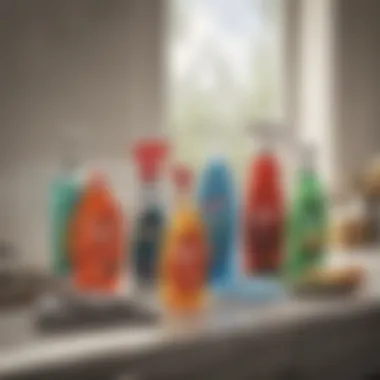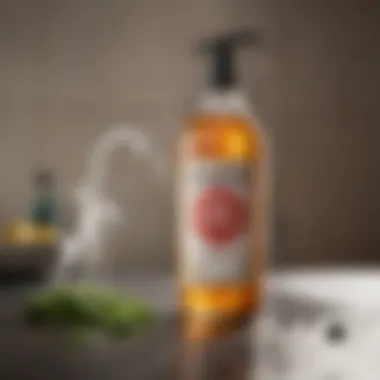Top Techniques for Sparkling Clean Shower Glass Doors


Intro
Cleaning shower glass doors can be a daunting task, especially when faced with stubborn mineral deposits or soap scum. Many homeowners find the process frustrating, as traditional cleaning methods often fall short. However, effective cleaning techniques exist that can restore clarity and enhance the aesthetic appeal of your bathroom. This guide aims to provide a comprehensive overview of various cleaning methods suited for shower glass doors, ranging from commercial products to homemade solutions. Each option will be examined for its efficacy, ease of use, and long-term benefits.
Maintaining the pristine condition of your shower glass doors is not just about appearances. It can ultimately contribute to the longevity of the glass and the overall hygiene of your bathroom. Preventing buildup ensures that cleaning time is reduced in the long run and prevents the need for harsh chemicals or abrasive tools. The following sections will explore methods, best practices, and some preventative tips to help you achieve sparkling results.
Understanding Shower Glass Doors
Understanding shower glass doors is critical for homeowners aiming not only for functionality but also for aesthetics. These doors are often a focal point in a bathroom, creating an illusion of space while providing the necessary barrier for water. Their construction typically involves tempered glass because it is more resilient compared to standard glass.
By familiarizing ourselves with the composition and common challenges, we can develop strategies that ensure longevity and clarity. The buildup of grime over time can detract from the beauty of this feature. Hence, knowing how to address these issues is beneficial for maintaining a visually appealing bathroom environment.
Composition of Shower Glass
Shower glass doors are generally made from tempered glass, which undergoes heat treatment to increase its strength. This treatment enables the glass to withstand the high moisture levels typical in bathrooms. It is also less likely to shatter into sharp shards if broken, making it a safer choice for home environments.
Another aspect of composition is the thickness of the glass. Most shower glass doors are about 3/8 inch thick, providing a balance of durability and weight. This thickness helps prevent warping and ensures that the doors remain sturdy over time.
Common Issues Faced
As beautiful and functional as shower glass can be, it is not immune to several common issues, all of which can affect its clarity and lifespan.
Water Spots
Water spots occur when hard water evaporates on the glass surface, leaving minerals behind. These spots accumulate over time, creating an unsightly appearance. The key characteristic of water spots is their visibility against the clear backdrop of the glass, making it a significant issue for many homeowners. Regular cleaning can effectively reduce their presence.
The unique feature of water spots is that they can indicate the quality of the water in your area. Hard water typically contains higher mineral levels that contribute to these spots. While they may seem like a minor annoyance, they can become permanent stains if not dealt with promptly.
Soap Scum
Soap scum forms when soap mixes with minerals in water. It creates a film that adheres to surfaces, and when combined with moisture, it becomes slippery and tough to remove. The key characteristic of soap scum is its ability to build up quickly, especially in showers that are used daily. This characteristic makes it a prominent focus in any discussion about maintaining shower glass.
Soap scum's unique feature is its adaptability; it can bond with various surfaces, making it persistent. While it can be removed with proper cleaning solutions, repeated exposure will necessitate a consistent cleaning routine to prevent its accumulation.
Mineral Deposits
Mineral deposits are another common problem. These occur due to high levels of calcium and magnesium in the water, leading to a chalky film forming on the glass. The key characteristic of mineral deposits is their toughness to remove without specific cleaners. They are a frequent reference in discussions about effective cleaning methods.
The unique feature of these deposits is that they often require acidic cleaners to dissolve. While they are not harmful, their build-up can compromise the transparency of your glass. Knowing how to deal with mineral deposits effectively is crucial for maintaining not only the look but also the longevity of shower glass doors.
Importance of Regular Cleaning
Cleaning shower glass doors is not merely an aesthetic choice; it carries significant functional and health implications. Regular maintenance ensures that these surfaces remain not only visually appealing but also hygienic and durable. A clean glass door enhances the overall look of the bathroom, making it feel more inviting and fresh.
Aesthetic Appeal
Aesthetics play a fundamental role in any space, especially in an area like the bathroom, which can significantly impact the home’s overall ambiance. Regular cleaning prevents the buildup of grime, soap scum, and hard water stains that can make even the most well-designed space feel neglected. Clear glass reflects light better, contributing to a brighter feel in the room. Simple yet effective cleaning can restore shine and improve the overall aesthetic. Additionally, a well-maintained shower door can enhance property value, as prospective buyers often notice the small details.
Preventing Damage
Neglecting to clean shower glass doors can lead to serious long-term damage. When soap scum and mineral deposits accumulate, they can etch and scratch the glass over time. This not only leads to a decrease in clarity but can also lead to the need for costly replacements. By implementing a regular cleaning schedule, homeowners can mitigate these risks, prolonging the lifespan of their shower doors and preserving their appearance. It is essential to use proper cleaning techniques and solutions to avoid harsh chemicals that may cause permanent damage.
Health Considerations
Regular cleaning does not stop at aesthetics; it is also an important factor for health. Shower environments are often damp, providing a perfect breeding ground for mold and mildew. These organisms can be harmful, especially for individuals with allergies or respiratory issues. Keeping glass doors clean reduces the risk of mold growth and ensures a healthier showering environment. This connection between cleanliness and health is often overlooked but is crucial for creating a safe space for all users.
"Regular cleaning of shower glass doors reflects not only care for your home but also consciousness about health and safety."


In summary, the importance of regular cleaning for shower glass doors extends beyond simple cleanliness. It enhances aesthetic value, prevents damage, and supports a healthy environment. Understanding these aspects motivates homeowners to maintain their showers more effectively.
Commercial Cleaning Products
The role of commercial cleaning products in maintaining shower glass doors cannot be overstated. These products excel at quickly handling tough stains that regular cleaners may struggle with. They are often engineered specifically for glass surfaces to provide clarity and reduce streaks. Using the right commercial cleaning products results in a more effective cleaning experience, saving time and effort.
Glass Cleaners
Glass cleaners are formulated for optimal clarity and minimal effort. They can be easily found in most stores and are a staple in many households. These cleaners typically feature key ingredients designed to cut through soap scum, water spots, and other residues, making them a popular choice for glass surfaces.
Types Available
There are several types of glass cleaners to choose from. These include ammonia-based, vinegar-based, and alcohol-based options. Each type has its own advantages.
- Ammonia-Based Cleaners: These are powerful and can dissolve tough grime effectively. They offer a rapid drying formula but may produce an odor that some people find unpleasant.
- Vinegar-Based Cleaners: Often considered more eco-friendly, they are effective at removing hard water stains and are less toxic. However, they may require more elbow grease compared to ammonia-based ones.
- Alcohol-Based Cleaners: Known for their fast evaporation rate, these cleaners leave behind minimal residue. They can be used on various surfaces but may not be as effective on heavy buildup.
The main characteristic that sets these cleaners apart is their active ingredients. Their effectiveness varies, so choosing based on actual needs is essential. An ammonia-based cleaner might suit someone needing heavy-duty cleaning, while a vinegar-based cleaner may appeal more to those concerned about chemical exposure.
Application Techniques
The technique applied when using glass cleaners greatly impacts the efficiency of the cleaning process. Most cleaners recommend spraying directly onto the glass and wiping with a suitable cloth.
- Spray, Wait, Wipe: A common technique involves spraying the cleaner, allowing it to sit for a few moments, then wiping it away. This method enables the cleaner to penetrate tougher residues.
- Circular Motions: Using a microfiber cloth in circular motions can prevent streaks and ensure a thorough clean. This effective technique helps in even distribution of the cleaner across the glass surface.
Each of these application methods comes with its unique features. The spray, wait, wipe technique may improve cleaning efficacy, but it demands some patience. On the other hand, circular motions require a bit of skill to perfect but can yield streak-free results.
Antimicrobial Solutions
Antimicrobial solutions take cleaning a step further by not just cleaning the surface but also sanitizing it. These products are particularly beneficial in environments where hygiene is a priority, such as bathrooms. They help in preventing mold and mildew growth, which can thrive in damp areas.
These solutions often contain agents that inhibit microbial activity, offering ongoing protection. This makes regular cleaning a bit easier; less buildup means that routine tasks take less time.
Homemade Cleaning Solutions
Homemade cleaning solutions offer an effective and economical alternative to commercial products. These solutions typically use common household items which can be found in many kitchens. They are favored not only for their cost-effectiveness but also for their environmental friendliness. Using homemade cleaners helps to avoid harsh chemicals, making them safer for both users and the environment.
Vinegar and Water Mixture
Preparation Method
To prepare a vinegar and water mixture, simply combine equal parts of white vinegar and water in a spray bottle. This basic method is straightforward and requires minimal effort. The acetic acid in vinegar is known for its ability to dissolve mineral deposits and soap scum, which are common issues for shower glass doors. This preparation method is regarded as an effective choice for cleaning glass due to its non-toxic nature and accessibility. One notable advantage is its ability to cut through grime without damaging the glass surface, making it a popular option for many households.
Usage Instructions
When you use the vinegar and water mixture, spray it generously on the glass surface. Allow it to sit for at least five minutes. This dwell time helps the mixture to penetrate the deposits before wiping with a cloth. Use a microfiber cloth for wiping to avoid streaks. This method is beneficial for maintaining the clarity of the glass and preventing the buildup of stains. However, it should be noted that the strong smell of vinegar can be a disadvantage for some users, though it dissipates relatively quickly once cleaned.
Baking Soda Paste
Preparation Method
To make a baking soda paste, combine baking soda with a small amount of water until a thick paste forms. This paste is particularly effective for tougher stains. The physical properties of baking soda allow it to act as a mild abrasive, which helps in scrubbing away stubborn grime without scratching the glass. The simplicity of this preparation makes it a beneficial solution for those looking to tackle more challenging cleaning tasks in their showers.
Usage Instructions
Apply the baking soda paste to the areas needing cleaning and scrub gently with a soft sponge or cloth. After a few minutes, rinse with warm water. This approach is popular because it provides both cleaning and polishing effects on the glass, leaving it shiny. One downside is that it requires a bit more physical effort compared to the spray methods, which may deter some users.
Dish Soap and Lemon Juice
To create a cleaning solution using dish soap and lemon juice, mix a few drops of dish soap in a bowl with fresh lemon juice. This combination not only cleans but also leaves a pleasant fragrance. The natural acidic properties of lemon juice help break down soap scum and mineral deposits effectively. As a cleaning solution, it offers a nice alternative to chemical-laden products, showcasing a simple yet effective cleaning strategy for shower glass doors.


Tools Required for Cleaning
To maintain the clarity and longevity of shower glass doors, investing in the right tools is essential. Each tool serves a specific purpose and contributes to achieving optimal cleaning results. Understanding the benefits and considerations of these tools enhances the cleaning experience and ensures effective use.
Microfiber Cloths
Microfiber cloths are a staple in glass cleaning. They have fine fibers that effectively trap dirt, dust, and water without scratching the glass surface. This tool's absorbent nature allows it to handle moisture better than traditional cloths. When using microfiber, it is important to wash them regularly to maintain their effectiveness. Damaged or dirty cloths can smear instead of clean, creating frustration. Choosing higher-quality microfiber cloths may result in better results and reduce the need for chemical cleaners. Their lightweight design also makes them easy to maneuver in tight spaces of shower enclosures.
Squeegees
A squeegee is an invaluable tool for preventing water spots and streaks on glass surfaces. After each shower, using a squeegee to remove excess water can limit mineral buildup and soap scum. There are various types available including ones with rubber blades for optimal contact and silicone for gentler applications. The ergonomic design enhances grip, allowing users to apply the right amount of pressure. While using a squeegee may require a bit of practice to master, the significant reduction in cleaning time makes the effort worthwhile. Squeegees can also be stored conveniently in the shower for quick access.
Scrubbing Brushes
Scrubbing brushes serve as a more aggressive cleaning solution for tougher stains. Unlike cloths, they have bristles that can help dislodge grime and deposits. It is crucial to choose brushes with soft bristles to avoid scratching the glass. Scrubbing brushes are typically effective for combating soap scum and mineral deposits that resist lighter cleaning techniques. Always apply appropriate, gentle pressure to avoid damaging the glass surface. Consider brushes with long handles to reach difficult areas, ensuring thorough cleaning without straining your back. Regular use of scrubbing brushes can prolong the cleanliness of shower glass doors, thus enhancing their appearance and lifespan.
Techniques for Effective Cleaning
When it comes to maintaining the clarity of shower glass doors, employing effective cleaning techniques is crucial. These methods not only enhance the visual appeal of the glass but also contribute to the longevity of the installation. Regularly using the right techniques can significantly reduce the buildup of soap scum, water spots, and other contaminants that commonly affect glass surfaces in bathrooms. This section will explore several practical methods for cleaning, focusing on the steps involved and the benefits each method offers.
Spray and Wipe Method
The spray and wipe method is one of the simplest and quickest techniques for cleaning shower glass doors. It involves using a liquid cleaner, usually commercially available or a homemade solution, which is sprayed over the glass surface. After allowing it to sit for a few moments, one simply wipes the glass with a microfiber cloth.
- Efficiency: This method is time-efficient and can be done frequently without much hassle.
- Versatility: You can use various cleaning solutions, such as glass cleaners or vinegar-water mixtures, making it adaptable to personal preferences.
To perform this technique successfully, it is essential to use a clean microfiber cloth to avoid scratching the glass. One should spray from top to bottom, ensuring all areas are covered. A second pass with a dry cloth can help eliminate any streaks left behind, maximizing clarity.
Scrubbing in Sections
When dealing with particularly stubborn stains or heavy buildup, the scrubbing in sections technique becomes vital. This method is characterized by breaking down the cleaning task into smaller, manageable sections.
- Thoroughness: By focusing on one area at a time, the risk of missing spots is minimized.
- Control: This approach gives more control over the scrubbing pressure applied, which is important for avoiding damage to the glass.
Start by wetting one section of the glass with a recommended cleaning solution. Use an appropriate scrubbing brush to work the cleaner into the surface. Afterward, rinse the area with water, then dry it with a microfiber cloth. Repeating this process section by section ensures a deep clean without overwhelming the space.
Using a Squeegee
Incorporating a squeegee into your cleaning routine can greatly improve results when caring for shower glass doors. This tool is commonly used after washing to remove excess water, effectively preventing water spots and ongoing buildup.
- Preventive: Regular squeegee use after each shower helps maintain cleanliness between thorough cleaning sessions.
- Effective Technique: With a squeegee, applying consistent pressure and using smooth, downward strokes ensures that all water is effectively removed.
After cleaning the glass with a preferred method, using a squeegee can significantly enhance clarity. A traditional rubber-blade squeegee or even a handheld version designed for bathrooms can simplify the process. The routine should include squeegeeing every time you shower to establish less frequent need for deeper cleans.
Preventive Measures
Preventing buildup on shower glass doors is as important as cleaning them. Implementing effective preventive measures can save time, effort, and resources in the long run. A clean shower door enhances the overall appearance of the bathroom, while also maintaining the quality of the glass. Regular maintenance strategies can contribute to an extended lifespan for the glass, minimizing the need for harsh cleaning products or frequent scrubbing. Here we discuss three key preventive measures: water softener installation, post-shower rinsing, and establishing a daily wiping routine.
Water Softener Installation
Water softeners are devices designed to reduce hardness in water. Hard water contains high levels of calcium and magnesium, which can leave mineral deposits on glass surfaces, resulting in unsightly stains. By installing a water softener, one can significantly diminish these deposits, leading to cleaner glass doors over time. The system functions by exchanging calcium and magnesium ions with sodium ions, thus softening the water used for showering.
Benefits of installation include:
- Improved clarity of glass surfaces.
- Reduced soap scum buildup.
- Less frequent cleaning required, saving time and effort.
Consider consulting with a plumbing expert to assess the best system for your home.
Post-Shower Rinsing


Rinsing glass doors immediately after use is a simple yet effective measure to prevent buildup. After showering, water and soap residue can cling to the glass surface, and allow soap scum and mineral deposits to form over time. By quickly rinsing the glass with clean water, these residues can be removed before they have a chance to dry and harden into stubborn stains.
How to effectively rinse:
- Use a detachable showerhead or a handheld sprayer for targeted rinsing.
- Ensure that all areas of the glass door are rinsed thoroughly.
Developing this habit may seem minor, but its long-term benefits in maintaining the cleanliness of your shower glass are substantial.
Daily Wiping Routine
Establishing a daily wiping routine is highly recommended for maintaining shower glass doors. Utilizing a squeegee or a microfiber cloth can effectively remove moisture and soap residue after every shower. Incorporating this practice into your daily routine significantly reduces the likelihood of buildup.
Steps for a daily wiping routine:
- After showering, grab a squeegee or microfiber cloth.
- Start from the top and work your way down.
- Make sure to wipe both sides of the glass doors for thorough cleaning.
This simple routine does not take much time and can deter the formation of stains, ultimately prolonging the life of the glass. With these preventive measures, homeowners can enjoy cleaner and clearer shower glass doors with less effort.
Evaluating Effectiveness of Different Methods
In the pursuit of maintaining clean and clear shower glass doors, it becomes essential to evaluate various cleaning methods. The reason for assessing the different approaches is to determine their efficiency, practicality, and suitability for different household needs. This leads to more informed choices, ensuring that homeowners select the best method for their specific circumstances. Factors such as time investment, overall cost, and environmental implications are crucial in this analysis.
Time Required for Cleaning
Time is a significant factor when choosing a cleaning method. Homeowners often lead busy lives, which makes efficiency paramount. The time required for cleaning shower glass doors can vary widely based on the method selected. For instance, using commercial glass cleaners may take less time due to their direct application and quick results. Conversely, homemade solutions like vinegar and baking soda might require more preparation and application time.
A quick comparison includes:
- Commercial Cleaning Products: 10 to 15 minutes.
- Homemade Solutions: 20 to 30 minutes, depending on the solution.
It's worth noting that while some methods might take longer in execution, they can provide more thorough results. Understanding the time commitment helps in planning and ensures that cleaning does not become a burdensome task.
Cost Analysis
Cost is another important consideration in evaluating the effectiveness of cleaning methods. Store-bought cleaning products often come with price tags that can add up, especially for premium brands. On the other hand, using homemade alternatives can significantly reduce expenses. Ingredients like vinegar, baking soda, and dish soap are usually inexpensive and easily accessible.
Here is a brief cost comparison:
- Commercial Cleaners: $3 to $10 per bottle.
- Homemade Solutions: Minimal cost, often less than $2 for multiple uses.
It’s essential to weigh not only the direct financial impact but also the longevity of the cleaning results. A more costly product might save time if it works effectively in one go, while a cheaper alternative might require multiple applications.
Environmental Impact
The environmental repercussions of cleaning products cannot be overlooked. Many commercial cleaners contain harsh chemicals that can potentially harm aquatic life when they wash down the drain. Furthermore, they may contribute to indoor air pollution. In contrast, homemade cleaning solutions typically consist of natural ingredients that are safer for both individuals and the environment.
When considering the environmental impact, it is crucial to evaluate:
- Commercial Cleaners: Often contain chemicals, high carbon footprint in production.
- Homemade Solutions: Generally eco-friendly with minimal waste.
"Choosing cleaning methods with a smaller environmental footprint contributes not just to personal well-being but also to the health of the planet."
Thus, when evaluating the effectiveness of different methods, it is necessary to examine these aspects thoroughly. Making informed choices leads to careful balancing of time, cost, and environmental responsibility, resulting in smarter cleaning habits for shower glass doors.
Closure
Summary of Key Points
- Regular Cleaning is Essential: It maintains clarity and prevents buildup, reducing the need for intense cleaning sessions that may damage the glass.
- Various Cleaning Methods Available: Commercial products, homemade solutions, and simple tools have been discussed, each with unique advantages.
- Preventive Measures are Key: Install water softeners and adopt routines like rinsing and daily wiping to reduce accumulation of grime.
Final Recommendations
- Adopt a Routine: Set a regular cleaning schedule to ensure glass stays clear with minimal effort.
- Experiment with Solutions: Try different commercial products and homemade mixtures to find what works best for your specific issues. The vinegar and water mixture is particularly effective for most shower glass doors.
- Invest in Good Tools: High-quality microfiber cloths and squeegees make a significant difference in the ease and effectiveness of the cleaning process.
By following the insights and recommendations provided, homeowners can achieve long-term results that not only keep their shower glass doors pristine but also contribute to a healthy and visually pleasing bathroom environment.



